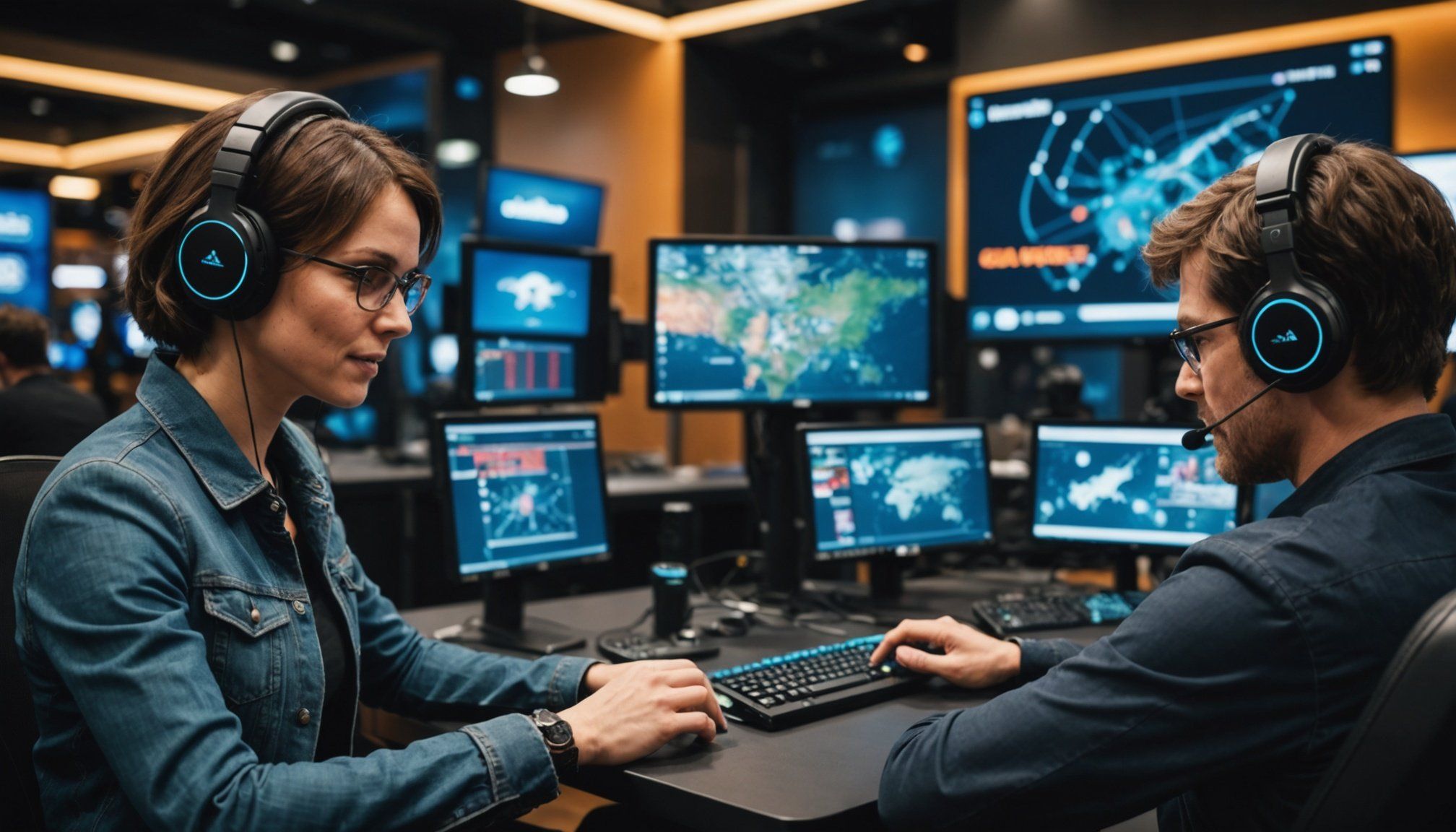Understanding the Role of AI in Gaming Economies
The integration of AI in gaming has markedly transformed gaming economies, redefining how in-game interactions and financial systems function. Historically, gaming economies operated on simpler mechanics with limited player-data analysis capabilities. Today, AI technologies such as machine learning and neural networks are increasingly relevant, delivering insights into player behavior and preferences. These insights drive more nuanced gaming economy transformations, facilitating more dynamic and engaging gaming experiences.
In modern gaming, AI enables real-time data-driven decision-making, impacting financial aspects significantly. For instance, adaptive pricing models and personalized promotional offers powered by AI have reshaped the way players interact financially within games. AI analyzes vast amounts of data to predict trends, making it possible for developers to respond swiftly to changes, thereby maintaining an optimal balance in supply and demand within the gaming economy.
Have you seen this : Unlocking Seamless Communication: Essential Techniques for Real-Time Language Translation in Multiplayer Gaming
Recent statistics illustrate the financial impact of AI, with prominent gaming companies reporting increased player engagement and revenue post-AI implementation. This transformation signals a shift towards economies where AI plays a central role in enhancing monetization strategies while simultaneously optimizing player experiences. As gaming economies continue to evolve with AI, the focus remains on using these technologies to deliver enriching, fair, and financially viable gaming landscapes.
AI Applications in Monetization Strategies
AI’s integration into gaming is reshaping monetization approaches, offering novel ways to enhance in-game revenue. By meticulously analyzing player behavior, AI-driven strategies craft personalized experiences that increase in-game purchases. For instance, AI identifies spending patterns and aligns them with tailored promotions, effectively increasing engagement and conversion rates.
This might interest you : Mastering Machine Learning Magic: Crafting Lifelike NPC Animations for Engaging Open-World Gameplay
Some games have demonstrated remarkable success with AI-supported monetization. A well-documented case involves a popular strategy game where AI was utilized to dynamically adjust in-game store prices based on player activity and preferences. This led not only to a spike in sales but also an enhanced player satisfaction due to the perceived value offered.
However, developers face the challenge of balancing aggressive monetization with player satisfaction. Excessive financial exploitation risks backlash and might drive players away. To mitigate this, AI can be pivotal in ensuring monetization strategies remain player-focused and fair. By prioritizing value over profitability, games can maintain healthy relationships with their communities.
Such strategies require constant refinement and ethical considerations, as AI’s decisions should never undermine player autonomy. This precise balance of AI-driven strategies fosters sustainable monetization, ensuring both financial success and enriching player experiences.
Enhancing Player Engagement through AI
Player engagement is pivotal in gaming, and AI is revolutionising it by creating personalised experiences. AI engagement tools analyse player data to tailor experiences that resonate on an individual level, boosting satisfaction and immersion. For instance, games leverage AI to adapt plots or difficulty levels based on real-time player performance, forging deeper connections and keeping players invested.
Several AI-driven tools play essential roles in this transformation. Dynamic game narratives powered by machine learning adjust storylines according to player choices, enhancing replayability. Additionally, AI-driven matchmaking systems create balanced teams in multiplayer games by considering player skills and styles, promoting fair and enjoyable competitive play.
Future predictions on AI’s influence suggest even more immersive player-community interactions. As AI evolves, we can expect it to facilitate deeper social connections within games through smarter non-player characters (NPCs) that can engage more naturally with human players, providing richer storytelling and enhancing community dynamics.
By continually refining these tools to cater to player preferences, developers can ensure that AI remains a catalyst for engaging and innovative gaming environments, ultimately shaping the future of interactive entertainment.
Challenges in Implementing AI in Gaming Economies
Navigating the challenges of AI integration in gaming economies can be complex. Developers face several common hurdles when implementing AI, including technical constraints and limited resources. Often, ensuring that AI systems can scale effectively while maintaining performance across different platforms remains a significant challenge.
Ethical considerations are crucial when deploying AI in gaming. Concerns around privacy, biased algorithms, and data security must be addressed to maintain player trust. Developers must ensure transparency in how player data is utilized and strive to mitigate any negative consequences of AI-driven decision-making. This includes being vigilant about the potential for AI systems to inadvertently create or exacerbate unfair gameplay mechanics.
To overcome these obstacles, implementing well-thought-out strategies is essential. Adopting an iterative development process allows teams to test, evaluate, and refine AI technologies continuously. Encouraging cross-disciplinary collaboration can also help address diverse challenges more effectively. Moreover, aligning AI implementation with industry-wide ethical standards ensures a responsible approach to innovation in gaming economies. Frequent player feedback can further guide sustainable AI development, maintaining a balanced ecosystem where innovation strides alongside ethical considerations. Such measures support the successful integration of AI while prioritizing the integrity of gaming experiences.
Future Trends in AI and Gaming Economies
The future of gaming is intricately linked with emergent technologies in AI, promising profound transformations in how we interact with and perceive gaming economies. As AI continues to evolve, we can anticipate several key AI trends that will impact the industry significantly.
One of the most significant advancements is the development of more intelligent game engines that can autonomously develop content. This capability could streamline the creation process, allowing for more frequent and varied updates that keep gaming worlds rich and engaging. Furthermore, AI’s role in creating lifelike non-player characters (NPCs) is set to enhance immersion, allowing for deeper and more personalized player interactions.
In terms of economic interaction, the evolution of sophisticated AI systems is anticipated to further shift gamer expectations. Dynamic pricing models will become more prevalent, adapting in real time to maintain equilibrium between supply and demand within virtual marketplaces.
Predictions suggest a shift towards highly personalized microtransactions driven by AI, offering players precisely what they desire, when they want it, while maintaining balance within gaming economies. As these AI innovations unfold, developers will be tasked with balancing technological capabilities and player satisfaction to ensure the thriving of a sustainable and vibrant gaming ecosystem.
Expert Opinions and Insights
Delving into industry insights, we uncover varied perspectives on AI’s integration into gaming. Experts agree that AI is reshaping traditional measures, offering significant potential for innovative growth. According to industry leaders, AI’s capacity to analyse vast datasets is pivotal for real-time adaptation and personalization in games.
Dr. Harold Chen, a renowned AI developer, suggests that AI’s influence in gaming is still in its nascent stages, with profound advancements awaiting. He notes, “The potential is vast; AI can redefine how games respond to players, leading to richer experiences.” This sentiment is echoed by Clara Ramirez from a leading gaming firm, emphasizing AI’s role in creating nuanced player interactions.
Many developers pioneering AI efforts are focusing on blending emergent technologies with existing frameworks. One standout approach is integrating AI to enhance narrative depth, shifting from static plots to dynamic ones that evolve with player decisions. These insights show that while AI transforms gaming landscapes, balancing technological prowess with player satisfaction remains key.
Comparative analysis of differing strategies, like autonomous content generation or AI-driven storytelling, showcases the diversity of AI applications in gaming. As AI continues to evolve, industry voices will undoubtedly guide its responsible and innovative incorporation into gaming economies.











